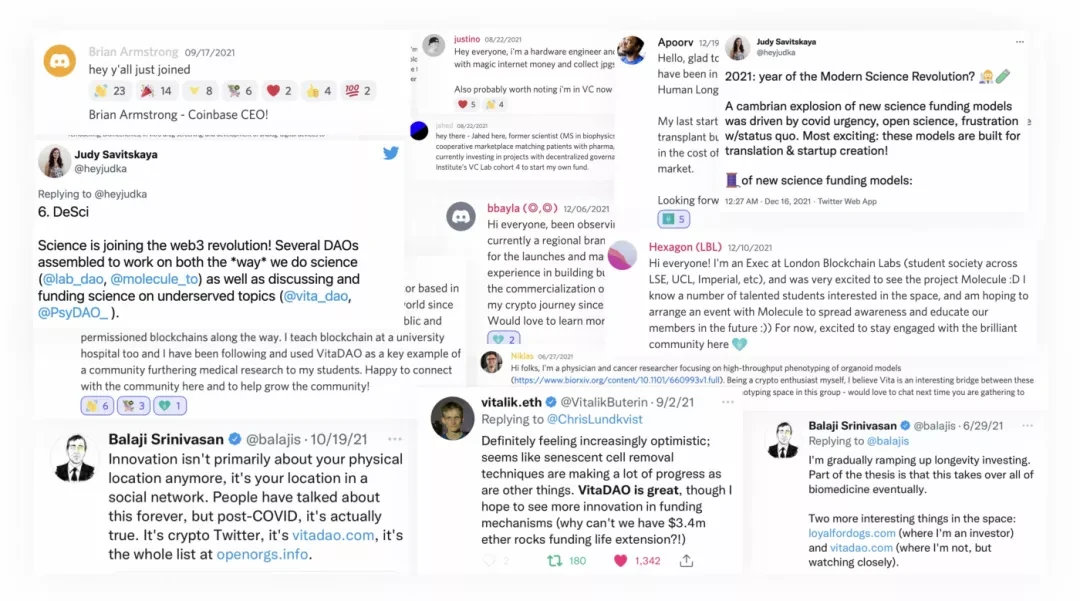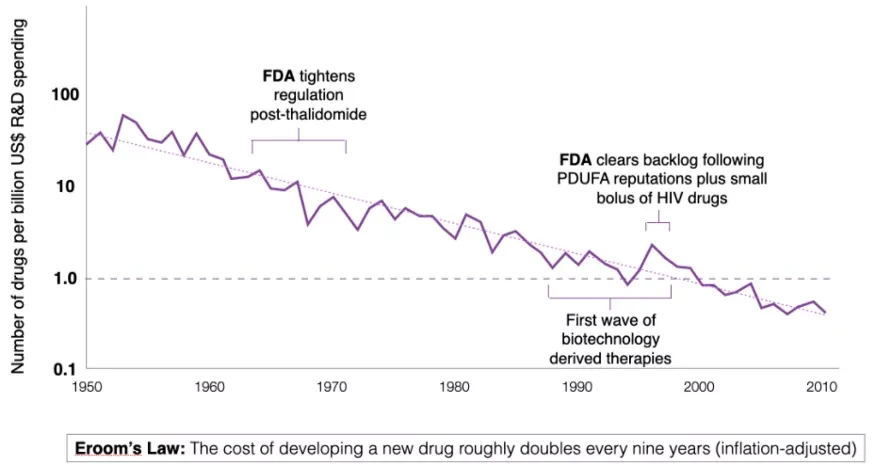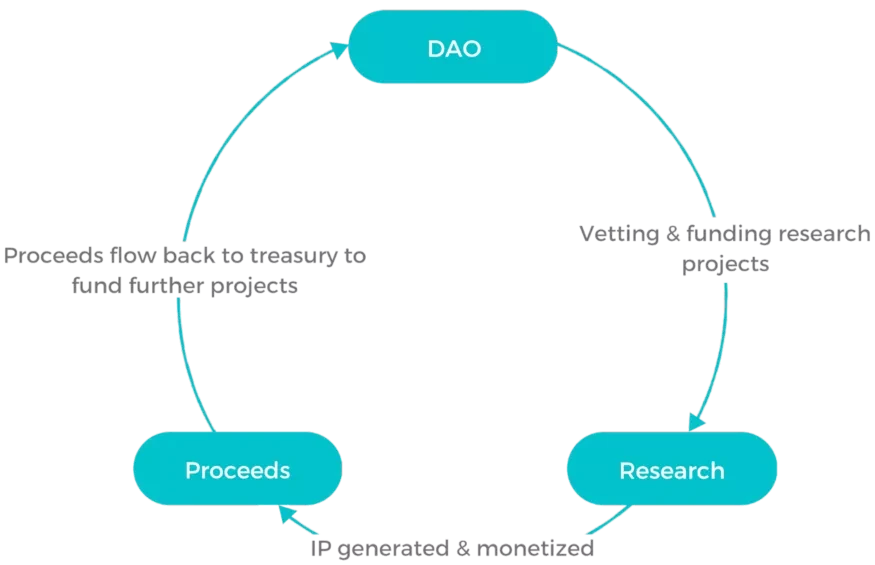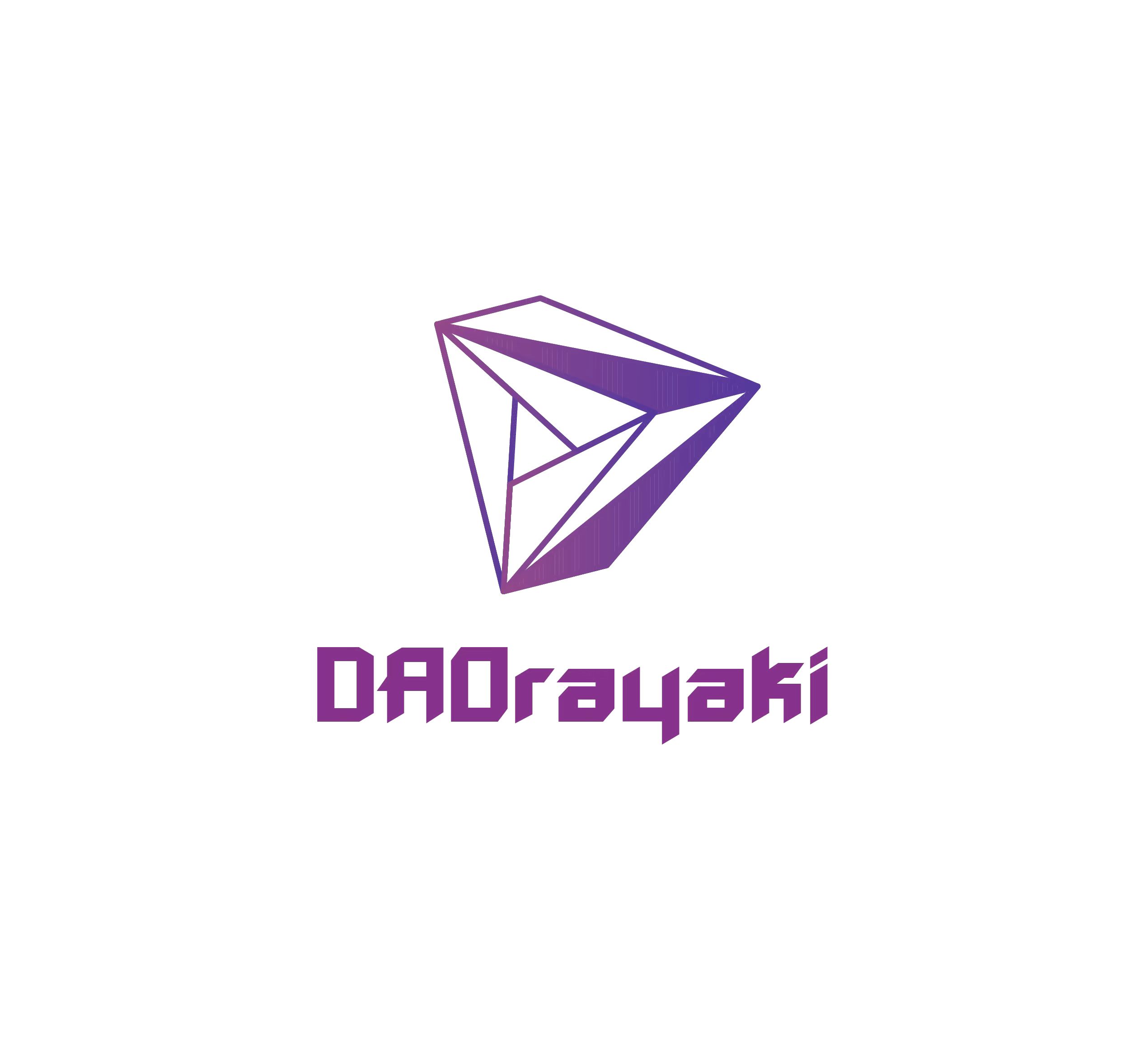Author: Tyler Golato
The Rise of Biotech DAOs
A thriving Decentralized Science (DeSci) movement is changing the landscape of the biopharmaceutical industry, fostering the formation of patient- and researcher-focused communities grounded in the ethos of open source.

Breaking Erooms Law
Were all familiar with Moores Law -- the number of transistors in a dense integrated circuit doubles roughly every two years, which roughly describes the exponential growth in computing power weve seen over time. Erooms Law (Moores Law, in reverse) refers to the fact that despite technological advances, drug development is getting slower and more expensive. While technologies such as high-throughput screening, combinatorial chemistry, and computational drug design can increase the rate of innovation, other systemic and institutional-level issues hinder progress, such as increased regulatory burdens, lack of open-source technology prevents new medicines from entering the market, and thus also hinders patients.

One potential explanation for this trend is failures in the coordination of capital and resources, combined with the monopoly intellectual property model prevalent in pharmaceuticals and biotech. These patterns inhibit information sharing and collaboration, confound data production, and create conflicting experimental results. While new laboratory technologies will not by themselves increase the efficiency of drug development, we believe that new advances in networking, coordination, and incentive technologies at the structural level can reverse this trend through new ways to optimize collaboration, talent, and capital allocation.
Biotech and pharma have historically been centralized in the form of large companies and organizations, lacking incentives to work in an open and collaborative manner. In other words, pharmaceutical companies have a closed source culture. The trend of decentralization is to overthrow centralized entities with monopoly power and move towards a network of co-existing collaborators in a flat hierarchical structure.
Decentralized communities achieve common goals by sharing pre-competitive resources within the community. They promote an open-source culture to their members and encourage them to collaborate using token-based mechanisms.
Decentralized networks provide a trustless environment where data coordination is improved, vulnerabilities are reduced, and resource distribution is optimized at scale. In the context of biotech, this means creating new organizational structures with low barriers to entry (e.g. logging into Discord), with built-in collaboration and incentives (WAGMI), that can coordinate general public and patients) funding and jobs. These features come in the form of decentralized autonomous organizations (DAOs).
DAOs are relatively new smart contract-based entities capable of coordinating capital, talent, and swarm intelligence on an unprecedented scale. More recently, a new Decentralized Science (DeSci) movement has rapidly changed the way science and biotech are coordinated by utilizing DAOs (see VitaDAO, PsyDAO, labDAO), and Molecule is increasingly positioned as a core infrastructure provider in the field .

The DeSci movement is currently forming a talent pool of entrepreneurial researchers and leading thinkers in biotech innovation who are frustrated with the status quo, whether it be funding, coordination, collaborations, or otherwise influencing young entrepreneurs in biotech and academic systemic issues. For example, the National Institutes of Health (NIH) allocates only 2% of its funding to scientists under the age of 36, while scientists 36 and older receive 98% of their funding. Among other things, this trend has caused enough frustration that several new organization types, such as FROs and DAOs, have emerged that aim to revolutionize the biotech field. But what exactly is a DAO? Why is it important and how will it change biotech?
Biotech DAO Design Space
Lets start understanding biotech DAOs by looking at the steps involved in creating a DAO and what they do. A suitable starting point for a biotech DAO is a clear vision and mission – what can these new, open organizational frameworks achieve? A biotech DAO could coordinate talent, enable decentralized fundraising and governance, or help create standardized data collection and generation methods, among other things. They can be charitable or for-profit. Although biotech DAOs have unlimited design space, their key innovation lies in the lack of gatekeeping capabilities and the use of technology to coordinate decision-making in large communities.
All biotech DAOs have one thing in common: they solve a problem that has hitherto been elusive due to the lack of incentives for broad collaboration in the biotech space.
To understand this better, we can take an example - VitaDAO, the first biotech DAO born from Molecule. VitaDAO is focused on funding early preclinical drug development in the context of longevity. When designing VitaDAO, Molecules goals were to:
Create a Schelling point and community building event at the intersection of Longevity and Web3 where researchers and the public can come together and participate in research and funding.
Fund cutting-edge, high-impact research in academia and help translate this research into effective medicines
Create a sustainable organization as a function of its commercial endeavors, from which proceeds provide an ongoing funding mechanism for longevity science.
The third point, a sustainable organization as a function of its commercial endeavors, requires that the DAO derive monetary value from its funding efforts. To this end, VitaDAO leverages Molecules IP-NFT framework, which allows DAOs to own, license and trade intellectual property generated from the projects it supports. VitaDAO is dedicated to funding early-stage research in academia and commercializing it. The DAO owns the IP generated by the projects it funds. For the first time, a large, decentralized community of researchers and patients gained value.

NFTs allow us to capture various asset types, including IP rights and data, and manage them natively in web3. Web3 allows these assets to exist in cyberspace, which means that no matter what country you are in, you can interact with them in some way, across borders, time zones and jurisdictions. This is a big step towards democratizing access to these assets. NFTs can be transferred to another wallet, tokenized, staked and loaned, sold on the NFT marketplace, and they can be programmed so that the original creator automatically receives royalties every time an NFT is resold.
At Molecule, the pioneering IP-NFT framework connects IP and data to NFTs, turning IP into a new highly liquid, tradable asset class, connecting web3 with the real world. Designs here are in the early stages, and these new tools will need to stand the test of time and the courts. Early data show that these approaches work.
BioDAO Framework
VitaDAO is the first design of a biotech DAO. One of Molecules core goals is to create a productized biotech DAO framework that allows anyone to build their own biotech DAO, operate on it, and start leveraging a large, open community to achieve their goals. To this end, Molecule is seeking to collaborate with motivated researchers, patient groups, entrepreneurs, community builders and visionaries interested in building at the intersection of biotech x web3.
We imagine these structures to be tools for shaping patient and researcher communities. Imagine a patient- and researcher-centric Biodao focused on Alzheimers disease research, a specific type of cancer or diabetes, with patient-researcher interactions throughout the end-to-end drug development process, from funding to licensing. There is a tight feedback loop and collaboration.
At Molecule, we see our core responsibility as helping builders in the following ways:
Enable biotech DAO builders to take advantage of our IP-NFT legal licensing framework and DAO organizational framework. We will support their efforts to collaborate with academics through Molecules marketplace.
Funding from the right source. We will provide liquidity and support to projects in the form of grants and token swaps. WAGMI.
Provide a talent pool that can move between DAOs to help build and lead all components of a DAO: finance, governance, operations, strategy, marketing, education, and search/evaluation. We have a network of researchers, entrepreneurs, builders, biotech venture capitalists and enthusiasts to help build the best organizations possible.
Help create robust global legal frameworks for specific biotech and patient-centered DAO communities, such as the for-profit LAO framework pioneered by Tribute Labs or the non-profit Swiss association.
PsyDAO will be the second biotech DAO launched by Molecule, with the ultimate goal of democratizing psychedelics. We aim to achieve this core goal through several related pathways. The first approach brings together researchers, opinion leaders, enthusiasts, and spiritual leaders to collaborate and shape the future of psychedelics research. Together, the group will fund psychedelics research in exchange for ownership of intellectual property that will be open source and available to all or commercialized. A key goal is to try to keep psychedelic intellectual property from being monopolized, either by leading the industry or buying publicly available intellectual property before it is patented. For example, this design principle is slightly different from that of VitaDAO.
Others in the ecosystem are also starting to build biotech DAOs with completely different functions than just funding. A prime example here is LabDAO. LabDAO is building a community owned and operated platform for scientific laboratory services, protocol exchange and data sharing. These organizations have a high potential for interoperability and collaboration.
You can imagine a scenario where organizations like VitaDAO acquire assets from Molecule’s discovery marketplace in the form of IP-NFTs. VitaDAO funds early preclinical de-risking experiments. Once positive data emerges and new experiments need to be performed, possibly beyond the scope of the funded lab, LabDAO (a community of laboratories) steps in to coordinate downstream development efforts and experiments through other academic labs and CROs. Decentralized drug development is starting to take shape. Additionally, IP-NFTs allow different contributors (such as LabDAO members) to take ownership of IP in exchange for work. These organizations begin to form a modular, decentralized drug development pipeline, each playing to its strengths and rewarded for their contributions.
All of these pieces come together to begin to form the basis of a collaborative, open, and inclusive ecosystem that has the potential to penetrate and transform monopolistic behavior in biotech to better serve the interests of patients and researchers. This is the beginning of a new field in biotechnology, and its only day one.
An open BIO ecosystem for humans
We want to help everyone who shares our dream of an open drug system. Currently, we are helping to build biotech DAOs such as:
VitaDAO — Focus on Funding Longevity Research
PsyDAO — focused on funding psychedelic research
Drug repurposing DAOs like Crowdfunding Cure
A DAO for the Rare Disease Community
At Molecule, we offer:
DAO and web3 framework
Practice Community Development Strategies
fluidity
Token Economy Design
fluidity
We intend to provide DAOs with funding and liquidity that will allow them to compete with the current VC and pharma models.
Also be sure to visit LabDAO - one of the most exciting new players in the DeSci community.
reference link
reference link
VitaDAO : https://vitadao.com/
PsyDAO : https://www.psydao.io/
labDAO : https://www.labdao.com/
Molecule : https://www.molecule.to/
IP-NFT : https://medium.com/molecule-blog/molecules-biopharma-ipnfts-a-technical-description-4dcfc6bf77f8
LabDAO : https://www.labdao.com/
Molecule : https://linktr.ee/molecule_to










